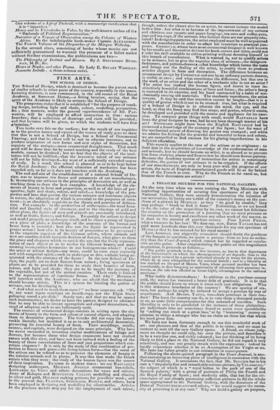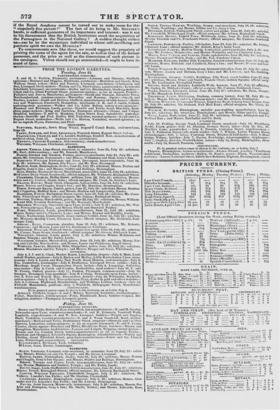A TREASURE SECURED FOR THE NATIONAL GALLERY.
AT the very time when we were twitting the Whig Ministers with neglecting opportunities of securing fine specimens of art for the National Gallery, they were secretly demonstrating the injustice of our accusation, by laying out 6,0001. of the country's money on the pur- chase of a picture by Munit.i.o : as they "do good by stealth," they may perhaps "blush to find it fame." Estimating, as we are bound to do, the value of the acquisition by its cost, we cannot but felicitate the country on the possession of a painting that we must presume as far surpasses in beauty and excellence any other work of the master, as it does in the amount of purchase.money. Poor Louis PHILIP, what a treasure he has lost ! We dare say, now, Baron TAYLOR has not paid more hundreds than this cost thousands for any one specimen of itleamr.o that he has secured for his royal master !
Lest, however, any niggardly economist should doubt the goodness of the bargain in question, we quote a passage from no less an autho- rity than the Court Journal, which cannot but be regarded as conclu- sive on this point. After congratulating the public on this magnificent acquisition, it proceeds as follows.—
" The public gratitude is due, in this instance, no less to that department of the Government on which the ehcouragement of art depends, than to the liberal spirit evinced by a private individual already in treaty for the picture, which he at once relinquished for the national benefit ; and to a liberality no less marked on the part of Messrs. Yates, whose personal sacrifice has been considerable, in thus foregoing an opportunity of advancing their pecuniary in- terests, as the sale was effected on terms highly advantageous to the national purchaser."
What noble disinterestedness! In addition to the purchase-money paid, the nation has incurred a heavy debt of gratitude. It is fit that the public should know to whom it owes such vast obligations. Who is this unknown benefactor of the country? We are sparing of sta- tues, but perhaps he might be induced to accept a pension by way of acquittance. And Messrs. YATES, too—how generous is their con- duct! The least the country can do, is to vote them a thousand pounds or so, as some little compensation for this unheard-of sacrifice. Such liberality is only to be paralleled in the instance of those philanthro- pic individuals who are sometimes found to assist even spendthrifts by ".selling out stock at a great loss," or by " borrowing " money on purpose to oblige a stranger who has no claim on them but that which his need gives him.
We have not been fortunate enough to see this wonderful work of art : our pleasure and that of the public is to come ; and we must be content to wait till the new Gallery opens. A friend, on whose judg- ment we thought we could rely, has seen the picture, and describes it to be a very fine one, and richly coloured ; but not thinking of its being likely to find a place in the National Gallery, he did not regard it very attentively, and was not greatly struck with the expression : indeed he hardly remembers whether it be an Assumption of the Virgin or no. His taste has fallen greatly in our estimation in consequence.
Following the above-quoted paragraph in the Court Journal, is ano- ther containing an interesing piece of intelligence in connexion with the National Gallery. It announces the fact, that Mr. SEGUIER has in his care a "singularly fine and remarkably curious picture, by VELASQUEZ,” the subject of which is a " royal battue in the park of one of the Spanish palaces," with a group of portraits of Philip the Fourth and the Royal Family of Spain ; and modestly adds, that but for the mr- cuinstance of our already possessing sufficient pictures to fill the whole space appropriated to the National Gallery, with the donations of the Duke of NORTHUMBERLAND and others, "we would suggest the neces- sity of procuring it at any cost." Why not build a gallery on purpose, if the Royal Academy cannot be turned out to make room for this 1, singularly fine picture?" The fact of its being in Mr. SEGUIEn'a Lands, is sufficient guarantee of its importance and interest : was it not to his discernment that the British Institution owed the acquisition of the Parmegiano in the National Gallery ? A sudden thought strikes us—can he be the mysterious individual to whose self-sacrificing and patriotic spirit we owe the Munit.Lo? To commemorate acts like these, we would suggest the propriety of printing the name of the agent for the sale, as well as that of the former possessor, and the price as well as the dimensions of each picture in the catalogue. Virtue should not go unrewarded—it ought to have its need of fame.



























 Previous page
Previous page